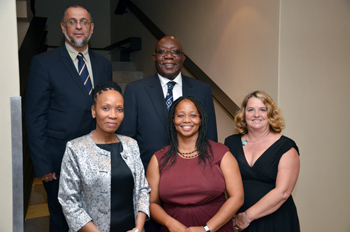Latest News Archive
Please select Category, Year, and then Month to display items
12 January 2024
|
Story Nonsindiswe Qwabe
|
Photo Sonia Small
 Since joining the UFS in 2008, Dr Grey Magaiza has worked extensively on approaches that can foster the socio-economic transformation of societies.
Since joining the UFS in 2008, Dr Grey Magaiza has worked extensively on approaches that can foster the socio-economic transformation of societies.
“The future should be one where communities can decide on their development agenda and futures. That’s the most important for me.” Dr Grey Magaiza, Deputy Director of the Centre for Gender and Africa Studies (CGAS) and Head of the Community Development programme on the Qwaqwa Campus, is passionate about capacitating communities to be agents of change and advancement. His vision for the future emphasises the empowerment of communities to take charge of their development by actively participating in decision making and the implementation of development projects that can improve their lives.
Since joining the UFS in 2008, Dr Magaiza has worked extensively on approaches that can foster the socio-economic transformation of societies. Over the years, he has crafted his research speciality into one that he is most proud of – being an interdisciplinary scientist immersed in the development of communities.
“I’m in a fortunate position of researching what I like. I say ‘fortunate’, because I’ve taken the time to understand what I’m passionate about, which is the overall field of rural livelihoods and livelihood futures – in short, community development. My research starts from an engaged university, understanding the elements that a university must use to enhance transformation and relevance to its immediate community in terms of development.”
One of the ways he has done this is by looking at social entrepreneurship as a development approach for young people in a rural setting. Through workshops with non-profit and civic organisations in Qwaqwa, Dr Magaiza has been helping these organisations to map out their needs and actively meet them through the involvement and support of external role players.
“We understand that communities are part of the national development agenda, but even that national agenda respects community knowledge and intentions and allows communities to shape their identity. A critical enabler of this is community organising. You bring back the capacity in communities to have dialogues on issues affecting them as spaces for engagement, knowledge exchange, and for people to just talk about their way forward.”
By enabling communities to define their development agenda, they can address their specific needs, challenges, and aspirations, he said. “When I look at livelihood futures, it’s quite an exciting aspect of my work – it’s like looking into a fortune tellers’ globe, because you’re not deciding for communities what they should do, but the communities themselves take those decisions.”
Twenty years of human rights - a call for reflection on the successes and challenges
2015-02-25

Back from the left are: Advocate Mohamed Shafie Ameermia, Commissioner, South African Human Rights Commission Advocate Lawrence Mushwana, Chairperson of the South African Human Rights Commission Front from the left are: Honourable Mahube Molemela, Judge President of the Free State High court and Acting judge of the Constitutional Court of South Dr Choice Makhetha, Vice-Rector External Relations, University of the Free State Prof Caroline Nicholson, Dean of the Faculty of Law, University of the Free State |
The South African Human Rights Commission (SAHRC), the Faculty of Law, and the Free State Department of Education hosted a gala dinner on 19 February 2015 to celebrate the launching of the Free State Provincial Division of the SAHRC, reaffirming their collaborative partnership, and confirming the commitment of the Free State Department of Education to community engagement, constitutional rights awareness, and youth advocacy.
The number of human rights abuses reported to the Human Rights Commission in recent years points to the complex nature of the challenges faced by South African communities. What is most disturbing is that the overwhelming majority of these offences are perpetrated by the youth, said Adv Lawrence Moshwana, Chairperson of the South African Human Rights Commission. “The Human Rights Commission is in need of support from government in order to be able to reach all provinces of South Africa”. The expansion of the commission’s services in the Free State and its partnership with the Provincial Department of Education is a great step towards protecting the rights of the most vulnerable communities.
Twenty years of human rights (read the full story)